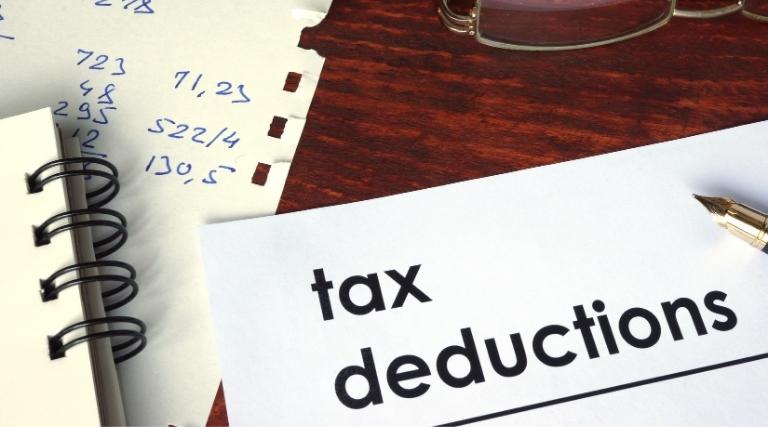You are aware that it is wise to diversify your holdings. You’ve probably heard that investing in rental homes can generate a significant, ongoing cash flow from largely passive income. However, did you know that it can also improve your financial situation come tax season?
Continue reading to find out how you may maximize savings on your yearly return and the many tax advantages of property investing.
1. Make use of real estate tax deductions

The tax deductions you can claim for your real estate investment are one of the largest financial advantages of this source of income. You may write off costs directly related to running, managing, and maintaining the property, like:
- Tax on real estate
- Homeowners’ insurance
- Home loan interest
- Fees for property management
- Costs associated with building upkeep and repairs
However, did you realize that a large portion of the costs associated with maintaining your real estate investment firm can be deducted? The following list is not exhaustive but includes qualified business expenses:
- Advertising
- The Workplace
- Business supplies, such as a computer, stationery, and business cards
- costs for counsel and accounting
- Travel
All of these deductions reduce your taxable income, which may result in tax payment savings for you. Consider that you have a rental income of $25,000 and qualified costs of $8,000 per month. This means that your real estate business’s taxable income is $17,000.
Keep thorough, accurate records and invoices to support your claims for reimbursement if the Internal Revenue Service (IRS) audits you.
2. Cost Depreciation Over Time
Depreciation is the gradual decrease in an asset’s value that is typically brought on by presumed wear and use. Depreciation is a tax-deductible expense for real estate buyers who own rental properties that generate income. As a result, you’ll likely have a lesser tax liability and less taxable income.
You may deduct depreciation over a property’s expected life, which is presently 27.5 years for residential properties and 39 years for commercial assets as determined by the IRS.
For instance, let’s say you buy a house to rent it out. The structure is worth $30,000, minus the land on which it is situated. You can deduct $10,909 in depreciation each year if you divide that amount by the dwelling’s anticipated lifespan of 27.5 years.
However, be ready to pay the usual income tax rate on the depreciation you’ve claimed once you sell. Depreciation recapture is a requirement that you can avoid by pursuing alternative tax planning options, such as a 1031 exchange (more on that below).
Advice:
Find out from your accountant how to depreciate significant renovations you’ve done to your rental properties, such as putting on a new roof.
3. Utilise A Pass-Through Deduction

You can deduct up to 20% of your qualified business income (QBI) from your taxes using a pass-through deduction. The money you receive in rent whether you hold rental property as a sole proprietor, as a partnership, or through an LLC or S Corp (known as pass-through entities) is regarded by real estate tax law as QBI.
For instance, you might earn $30,000 in rental income each year if your LLC owns an apartment building for wealth creation. You can deduct up to $6,000 utilizing a pass-through deduction on your tax return. Naturally, there are some laws and regulations that must be observed, so speak with your accountant.
4. Benefit from Capital Gains

When you sell an item, like a piece of property, for a profit, a capital gains tax may be imposed. Short-term and long-term are the two categories to be mindful of. They all have various effects on your tax situation.
Gains in the Short Term
When you make money when you sell an asset within a year of purchasing it, you have realized a short-term capital gain. Even if selling might be your only option, you should be aware that it will affect your taxes. This is due to the gain being considered ordinary income.
As a result, your income effectively doubles for tax purposes if you earn $100,000 from your day job and sell a property investment for a $100,000 profit. If you file as a single person, your increased income (as of 2020) moves you into the next tax bracket, which could result in a higher tax obligation than you had anticipated.
Gains in Long-Term Capital
On the other hand, if you make money from the sale of an asset that you’ve owned for a year or more, you’ll experience a long-term capital gain. You’ll be able to keep more of your earnings if you can hold off on selling until the anniversary of your purchase. This is because long-term capital gains are taxed at a rate that is far lower than your normal income.
Additionally, if your income is too low, you could not even be required to pay the tax. Let’s say you and your spouse file a joint tax return and have an annual income of $75,000. The fact that your income is taxed at 0% means that the long-term capital gains are tax-free. In other words, you get to keep every penny of the proceeds from the sale of your property.
5. Postpone Taxes Using Incentive Programmes

The government occasionally creates a unique tax regime to encourage investors. Let’s discuss opportunity zones and the 1031 exchange, two significant real estate tax advantages.
Exchange 1031
The government wants to reward people who reinvest their real estate gains into new ventures, which is why 1031 exchanges exist. The program allows you to swap them for tax reasons as long as the new property you acquire is of equal or greater worth than the one you sell. The capital gains tax on the sale of the first property can therefore be delayed.
The 1031 exchanges are continuously usable. However, you’ll have to pay any taxes due when you want to cash out your profits. Depending on the time of your purchase and sale transactions, the program is offered in a few distinct versions. It is advisable to speak with a skilled financial advisor because the program can be challenging to understand and fully utilize.
Possibility Zones
Low-income or underprivileged areas of land are referred to as opportunity zones by the Department of Treasury. By providing tax benefits, the 2017 Tax Cuts and Jobs Act encourages investors to participate in growing and boosting these regions’ economies.
You contribute your unrealized capital gains to a Qualified Opportunity Fund along with those of other real estate buyers. That fund’s proceeds are used to enhance the chosen location.
The following tax benefits are yours if you follow the program’s guidelines:
- Until 2026 (or until you sell your fund stake), postpone paying capital gains.
- Increase your capital profits by 10% after five years and by 15% after seven.
- If you keep your investment in the fund for more than ten years, you can completely avoid paying capital gains.
6. Work for Yourself Without Paying FICA Tax
You often have to pay both the employer and employee portions of the FICA tax (which pays for Social Security and Medicare) if you work for yourself. Owning rental property, however, prevents the money you make from being counted as earned income. You can thereby avoid the FICA tax, often known as the payroll tax, which is one of the least discussed real estate tax benefits.
This is how the math works:
Let’s imagine that you own a $ 50,000-per-year freelance writing company. You must pay the payroll tax since that sum is regarded as earned income.
You would have to pay $7,650 in taxes at a rate of 15.3%. However, if you own rental property, you would be able to retain that money in the bank.
Make Use of Tax Breaks

Tax benefits are just one of the many perks of property investing. A house as an investment on your mind? To ensure you have the financial information you need to make a sound purchase, get preapproved first.
Obtain approval to determine your affordability.
